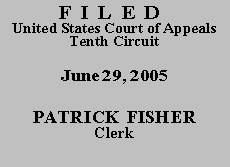

| STATE OF NEW MEXICO, ex rel.
Stuart L. Stein, Esq.,
Plaintiff-Appellant, v. WESTERN ESTATE SERVICES, INC.; AMERICAN FAMILY LEGAL CENTERS, Defendants-Appellees. |
|
Stuart L. Stein is a New Mexico attorney who maintains an estate planning practice in Albuquerque. Defendants are corporations who placed an advertisement in a Santa Fe newspaper, offering living trust seminars and estate planning services. Mr. Stein brought this action in federal district court against the defendants, seeking to enjoin them from "ongoing acts of illegal advertising" and from future violations of New Mexico's statutes prohibiting the unauthorized practice of law. Aplt. App. at 7-8. Mr. Stein's complaint asserted two bases for jurisdiction in federal court: (1) the defendants' alleged "violation of the First Amendment commercial speech provisions of the United States Constitution"; and (2) their alleged violations of state laws "with cumulative damages in excess of $75,000." Id. The district court dismissed his complaint with prejudice for lack of federal jurisdiction.
On appeal, Mr. Stein argues that since his complaint "raises the issue of the application of the First Amendment to the issues concerning the subject advertisement," Aplt. Br. at 6, the district court had subject matter jurisdiction over the "federal question" raised in his complaint. See 28 U.S.C. § 1331 (stating federal district courts "shall have original jurisdiction of all civil actions arising under the Constitution, laws, or treaties of the United States.").(1) The district court concluded that Mr. Stein's argument, that the defendants had no First Amendment right to engage in illegal advertising, did not establish federal jurisdiction. See Aplt. App. at 66. Our review is de novo, see Qwest Corp. v. City of Santa Fe, 380 F.3d 1258, 1263 (10th Cir. 2004), and we affirm.
It is hornbook law that in order to establish jurisdiction under § 1331, a plaintiff must show that a question of federal law appears on the face of his well-pleaded complaint.
Whether a claim arises under federal law must be determined by reference to the [plaintiff's] well-pleaded complaint. It is well settled that a defense that raises a federal question is inadequate to confer federal jurisdiction. Federal-question jurisdiction is not present even if the [federal] defense is anticipated in the plaintiff's complaint, and even if both parties admit that the defense is the only question truly at issue in the case.
Nicodemus v. Union Pacific Corp., 318 F.3d 1231, 1236 (10th Cir. 2003) (internal quotations omitted). Mr. Stein's only attempt to meet the well-pleaded complaint requirement in his complaint was to charge the defendants with "violating" the commercial speech provisions of the First Amendment. The facts of the complaint, however, establish no such "violation" by the defendants. Instead, the First Amendment's commercial speech doctrine is relevant only as a defense to Mr. Stein's complaint concerning illegal advertising. As we have noted, however, the potential for such a constitutional defense, even if central to the issues at stake in the action, does not itself create federal question jurisdiction. See id. Therefore, the district court properly found that it lacked federal question jurisdiction over Mr. Stein's complaint.
Mr. Stein further argues that the case should have been dismissed "without prejudice for the plaintiff to file the matter again in a proper forum." Aplt. Br. at 8. We need not remand for entry of a dismissal without prejudice, as he requests. His ability to refile in another court rests on questions of claim-preclusion lawnot in the way the dismissal is styled. Styskal v. Weld County Bd. of County Comm'rs, 365 F.3d 855, 859 (10th Cir. 2004). "Whether [Mr. Stein] is barred from filing [his] claim in [New Mexico] state court . . . is not determined solely by how the federal court dismissal is styled. As a result, the relief sought by Plaintiffrestyling the federal court dismissal as 'without prejudice' is beside the point." Id.
For the foregoing reasons, the judgment of the district court is AFFIRMED.
Entered for the Court
Circuit Judge
*. This order and judgment is not binding precedent, except under the doctrines of law of the case, res judicata, and collateral estoppel. The court generally disfavors the citation of orders and judgments; nevertheless, an order and judgment may be cited under the terms and conditions of 10th Cir. R. 36.3.
1. Mr. Stein does not continue to argue on appeal that his complaint belongs in federal court under a theory of diversity jurisdiction.